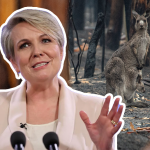
We weren’t the only ones who felt like 2022 was a lot, right? Looking back at some of the stories we’ve covered, big and small, throughout this year was shocking. Novak Djokovic getting unceremoniously booted out of Australia (and the Open) for being an anti-vaxxer? Yeah, that happened this year. While there was clearly a lot going on, we’re honing in on the moments from news and pop culture that will have an ongoing impact – either influencing events in the years to come or changing the way we think about the world.
In chronological order, these are the 11 most influential moments of 2022 that will shape the years to come. Do you think we missed any?
1. Russia Invades Ukraine (February)
On 24 February 2022, Russia invaded Ukraine in an escalation of a long-simmering border conflict. Tens of thousands of people have been killed, including civilians, children, aid workers, and journalists. The Western world rallied behind Ukraine and charismatic President Volodymyr Zelenskyy, who was named TIME Magazine’s 2022 Person of the Year. But that support has asked challenging questions about which conflicts we see as ‘deserving’ of support; in Australia, valid criticisms were raised about the government’s willingness and speed in accommodating Ukrainian refugees, compared to our treatment of asylum seekers from other regions.
The war has also caused the global energy crisis. Russia supplies a huge amount of the oil and gas required to power Europe and the world – the war has caused extreme price volatility, making electricity very expensive. It’s also contributing to Australia’s energy crisis, as local gas producers chased the higher prices in Europe, creating more demand and higher prices here.
2. Industrial Action Everywhere (from February)
Locally and abroad, there was a lot of industrial action as workers demanded better pay, conditions and rights in a variety of sectors. Rail workers in the U.K and NSW have received a huge amount of media coverage; as have high profile unionisation efforts at Apple, Amazon, Starbucks, the New York Times, Tesla; and teachers, hospital workers, airport workers, bus drivers and more have gone on strike at various points across Australia. And public sentiment has been mostly supportive – everyone is feeling the pain of low wages growth.
The economic restlessness won’t slow down in 2023, so we’re expecting to see even more industrial action next year as workers demand a better deal from corporations not passing on the profits that they have generated.
3. Australia’s Ever-Increasing Inflation (from March)
Remember the headlines about $12 lettuce? $2 per litre petrol? The cost of living became a certified crisis this year. It all began with the release of the first quarterly CPI report by the Australian Bureau of Statistics in March – prices had inflated by 5%. As the year went on, the numbers got worse with inflation expected to peak at 8% in early 2023 – way outside the normal range of 2-3%. It has millions of Australians living in poverty or on the brink.
The reasons for the dire economic situation we’re in are threefold: Russia’s war in Ukraine driving up oil and gas prices; climate disasters (fires, floods) destroying crops, making food more expensive; and record-breaking corporate profits, enabled by the past two decades of politics.
4. Depp v Heard (April)
The defamation case of Johnny Depp versus Amber Heard took over conversations, headlines and For You Pages while the trial ran from April to June. Both actors were suing each other for different instances of defamation cases, and both parties technically succeeded. The jury did find that Depp had been defamed in a 2018 op-ed that highlighted domestic abuse allegations, for which the judge awarded Depp a total of $10.35 million in damages. They jury found that Heard has also been defamed in public statements made by Depp’s lawyers, for which she was awarded $2 million in damages.
The case was not only tried in the Virginia court but also in the court of public opinion. Clips of the trial were plastered all over social media, sparking harsh and often misguided, misogynistic ‘debates’ around domestic abuse, victims and the justice system. As we wrote in June, there were no winners here.
5. Elon Musk Buys Twitter (April)
Sigh. Elon Musk was on his billionaire bullshit in a major way this year. It’s almost too exhausting to explain. It started in April, when Musk wanted to join Twitter’s board of directors, after becoming a major shareholder. It ended in… well, it hasn’t ended yet, although he is now the sole, private owner of the social platform and is driving it into the ground.
Musk’s changes to the platform will (and already are) increase hate speech, whip up dangerous conspiracy theorists, and make the general news landscape worse. Even if you don’t use Twitter, it was a really important tool for journalists to find experts and academics to inform reporting – the new Twitter is making that much harder, creating worse news content for all of us.
6. Labor Wins the Election (May 2022)
Influential in the most literal sense, after nine years in opposition the Labor party triumphed at one of the most chaotic federal elections in recent memory. Prime Minister Anthony Albanese’s victory speech was genuinely moving, and the new Parliament is the most diverse in Australian history. While the voting result was moreso an emphatic rejection of Scott Morrison and the increasingly conservative Coalition… but still, a win is a win! The new government ran with it for a very productive first six months, passing landmark legislation and ambitious reforms.
We can’t talk about 2022 and the election without mentioning the huge impact of the independent candidates. They stand as proof that individuals can have influence, that democracy can always be more representative, and that collective, grassroots action is worth pursuing.
If we’re seeing the rise of REPRESENTATIVE democracy (you know, the system we supposedly have) I’m all for it #ausvotes
— Crystal Andrews (@crystal_jane) May 21, 2022
7. U.S. Supreme Court Overturns Roe vs Wade (June)
The U.S. Supreme Court overturned Roe v. Wade, the landmark piece of legislation that made access to an abortion a federal right. Despite widespread protests across the nation and internationally, the decision dismantled 50 years of legal protection and has now paved the way for individual states to completely ban abortion rights. Since the decision was made, at more than 40 states have prohibited abortions after a certain point in pregnancy, and 13 states have banned abortion completely.
The overturning of Roe v. Wade also calls into question the legitimacy of the Court, which is expected to maintain precedent. This precedent prevents landmark decisions from changing every so often, ensuring governmental stability. But with domestic politics in the U.S. becoming increasingly polarised, and the Supreme Court increasingly partisan, democracy has never felt more precarious.
8. Neighbours Out, Heartbreak High In (July)
There were big changes in Australian TV this year – one kind of sad, the other very promising. We said goodbye to Neighbours after 37 years and nearly 9000 episodes. The farewell was bittersweet, as the decision was made by UK network Channel 5 (rather than Channel 10). Although Neighbours will return in 2023 on Amazon, it does feel like Australia’s cultural landscape has outgrown the show.
Case in point: the hugely successful Netflix reboot of Heartbreak High. The show’s navigation of intersectional experiences with complexity and compassion won hearts around the world – it shot to #1 on Netflix Australia in the first week, and hit the top 10 list in 45 other countries. We’re counting it as a welcomed success story for a) teen shows that actually feel genuine rather than reverting to cringe stereotypes, and b) proving that international streaming services should invest in original Australian content.
9. Iran Protests & Mahsa Amini (September)
Iran has a long and painful history of protest, and this year’s unrest is another powerful example. On September 16, the death of Mahsa Amini while in the custody of Iran’s morality police, has sparked months of protest across the nation. Amini, a 21-year old Kurdish woman, was arrested while in Tehran for allegedly wearing her hijab ‘improperly’. What began as protests against mandatory hijab laws has now become an urgent call for full-scale revolution, with Iranians demanding that the Islamic Republic, the country’s oppressive theocracy, be dismantled.
Amini become a symbol of resistance for the people of Iran. To date, authorities have arrested over 10,000 protestors and have begun convicting them in sham trials, hastily sentencing them to death and executing them. It’s a potent reminder of how precarious democracy can be, and how important it is to protect.
10. Bruce Lerhmann Sexual Assault Trial Dropped (October)
Brittany Higgins’ allegation that she was sexually assaulted by a colleague at Parliament House was one of the most groundshaking moments of 2021. The legacy of that brave decision continued to shape Australia this year in dramatic fashion: the trial commenced, was thrown out after misconduct by one of the jurors, and the decision was made not to pursue a re-trial in the interest of protecting Higgins’ wellbeing.
Last year, the focus of this reckoning was on the inescapability of sexual and gendered violence in Australia for even the most privileged women. This year, the events of the trial put the spotlight on just how badly the so-called justice system fails survivors. The impact of this story is far from over: Lehrmann is considering pursuing defamation claims, the Australian Federal Police is being investigated over interference (in favour of Lehrmann), and more states are passing affirmative consent laws.
11. Four-Day Work Week Trial Results (December)
The momentum behind the concept of a four-day work week seriously picked up this year. In December, non-profit org 4 Day Week Global revealed the results from their biggest trial to date. The premise was simple: at 33 companies, workers received 100% of their pay for 80% of their working hours, while keeping their output and productivity at the same level. The results were outstanding, with none of the participating companies planning to return to their five-day schedule. Of the 495 employees involved, 97% said they wanted to continue with a four-day week. They reported lower levels of stress, fatigue, insomnia and burnout, as well as improvements in physical and mental health.
The trial was equally positive for companies. According to the post-study survey, the companies saw an average increase in revenue of 38%, compared to the same period last year. Maybe forward this to your boss?




Comments are closed.